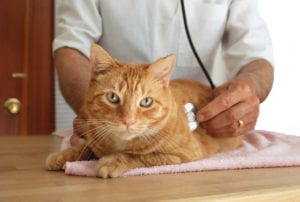As a cat owner, it’s important for you to recognize the most common emergencies your feline friend may face. Although you likely don’t want to think about the possibility, you should always be aware of these potential problems and ready to take your cat to an emergency vet to deal with them if they arise.
Check out the list below to brush up on cat emergencies and educate yourself for the health and well-being of your cat.

Obvious Injury or Trauma
It may go without saying, but if you see an obvious gaping wound or broken bone in your cat, this means it’s time to get to the vet right away. Outdoor cats are more likely to show up with a problem like this, but injury can happen to any cat at any time.
Collapsing
Cats usually sleep soundly, but they can eventually be woken up even from the deepest of slumbers. If your cat collapses or is entirely lethargic and cannot be woken up, you need to take her to the vet right away. This could be a sign of many severe illnesses and may even be a sign that your cat is dying.
Some causes of collapse in cats are treatable if caught early enough. Only your vet in North Hollywood will be able to find out the underlying cause of the problem and offer suggestions moving forward.
Seizures
If your cat has a seizure for the first time, take her to the vet, even if you think it may be the only seizure she experiences. Additionally, if your cat has several seizures within a few hours or if the length of the seizures gets progressively longer over a few days, she needs to get to the vet immediately.
Some cats may have epilepsy and may be prone to seizures. Your vet will be able to diagnose your cat and let you know if this is the case or if something else is causing her to convulse.
Lack of Food or Water Intake
Some cats are picky and take their time eating; other cats only drink water once or twice a day. However, if your cat stops eating or drinking entirely and isn’t at all interested in food or water, then it’s time to take a trip to the vet.
Lack of food and water intake are common signs of diabetes, kidney failure, liver failure, and fatty liver. These symptoms may also be a sign of bowel obstruction if your cat has swallowed something she shouldn’t. Your vet will need to take X-rays and assess your cat for more information.
Extensive Diarrhea and Vomiting
Many cats have diarrhea once every now and then. Many more cats vomit often, usually because of hairballs or from eating grass. But extensive diarrhea and vomiting for more than two days warrant a trip to the vet, especially because your cat can quickly become dehydrated from these conditions.
Howling in Pain
Cats who are howling in pain need vet care right away. There could be all sorts of problems causing your cat to be in pain, and only your vet will be able to tell you for sure. Many of these issues are treatable, especially if they’re caught in time.
Hind End Paralysis
Sudden hind end paralysis in cats is almost always a symptom of aortic thromboembolism. This condition is common and, sadly, usually fatal. It causes significant pain in the cat and quickly leads to death if not treated by a vet within a very short amount of time.
This condition occurs when cats have heart disease. It is caused when a blood clot lodges in the hip or leg area of the cat’s body. The cat can no longer walk and will likely howl in pain and show other signs of extreme distress when affected.
Trouble Breathing
Any cat with trouble breathing will need immediate vet care. Cats who are panting are probably in pain, but they may also be overheating or have a respiratory infection. Other signs of breathing distress include visibly heaving sides, wheezing, coughing, rattling breath, and other odd noises coming from the cat while she breathes.
Don’t wait if you notice your cat breathing strangely. Get to the vet immediately, and consider going to an emergency vet if it’s after-hours. Breathing difficulties can quickly lead to a lack of breathing altogether and may be fatal depending on the underlying cause.
Urination Issues
Male cats are prone to developing urinary obstruction due to crystals in the bladder or urethra. This is an extremely painful condition that may cause cats to sit in the litterbox and howl in pain. They may have blood in their urine and may be unable to urinate at all, and they may urinate outside the litterbox often.
This problem is extremely dangerous and often fatal if left untreated. It can cause heart attack, kidney failure, and bladder failure or rupture if you don’t take your cat to the vet immediately. However, the problem is highly treatable and can be managed easily by putting your cat on a bladder health diet.
Bitten by Another Cat
If your cat has been bitten by another cat, you may need to go to the vet quickly. If the other cat also belongs to you, then you know whether or not your cat is at risk for any feline-born diseases. If not, however, then you should go to the vet to find out more about your cat’s health and to have the bite wound assessed.
These are just some of the problems your cat may encounter throughout her life. Remember that your vet is your best resource, no matter what health problems or injuries your cat may be going through. Cats have a number of health risks, but keeping up with regular vet appointments can help you ensure your cat has a long, healthy, fulfilling life. Don’t be afraid to reach out to the vet for more information and with any questions you may have about the risk of any of these potential problems.



